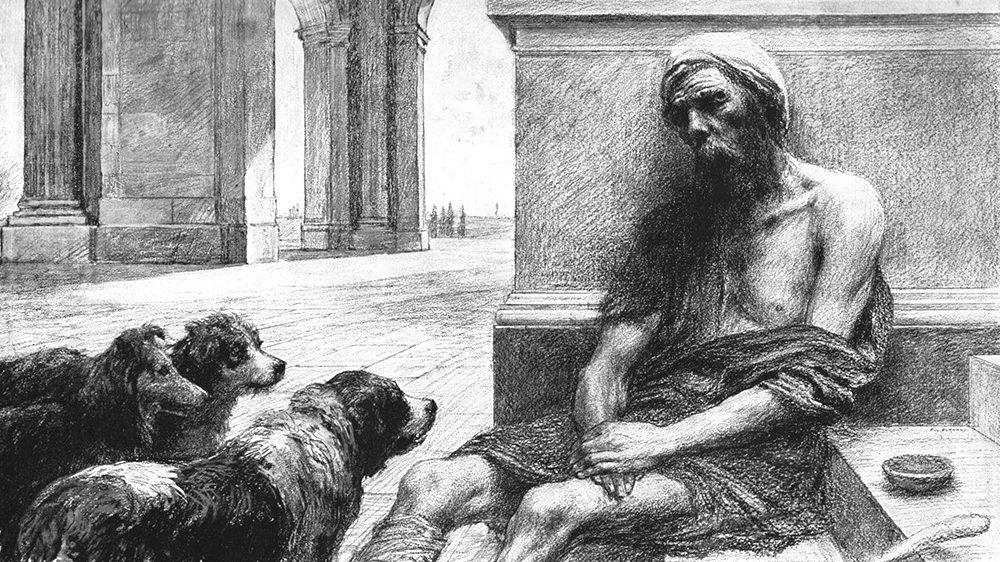The Rich Man’s Need
26th Sunday of Ordinary Time

The parable of Lazarus and the Rich Man is unique for a few reasons. It is the only parable where one of the characters is given a name. Usually the people in Jesus’ parables are anonymous — a servant, a master, a shepherd, etc. — but this parable features a man named Lazarus, the same name as Jesus’ friend whom he would later raise from the dead. This parable is further unique in that part of the story takes place in the afterlife. It can therefore be tempting to read it for clues about what the afterlife might be like, but we must remember that this is a parable, not a description of a real event, so we shouldn’t press it too hard for specific details. Jesus’ point in telling it is to give us information for this world, not to describe what heaven or hell look like.
So what lessons are we meant to take away from this story? On one level, this parable is a precursor to the resurrection; both Jesus’ resurrection of Lazarus and his own resurrection from the dead. The rich man, having been condemned for his lack of charity, begs Abraham to send Lazarus back from the dead to warn his brothers. But Abraham tells him, “If they will not listen to Moses and the prophets, neither will they be persuaded if someone should rise from the dead” (Lk 16:31). Jesus is foreshadowing the lack of belief of those who fail to heed his own words, even after he rises from the grave.
More generally, this parable is a reminder that we will all face judgment in the next life according to the love and mercy that we show (or fail to show) in this life; and that true charity is practical, not just theoretical. As the scriptures point out, if someone lacks food or clothing and you say to them, “Go in peace, keep warm, and eat well,” but you do not give them the necessities of the body, what good is it (James 2:16)?
This is, above all, a parable about the commandment to love your neighbor as yourself, which Jesus says is linked to the first and greatest commandment to love God with all your heart, soul and mind (Mt 22:38-39). You cannot claim to truly love God if you do not love your neighbor who is made in God’s image. Jesus tells us to love our “neighbor” specifically and not “everyone” generically because “everyone” is a faceless concept, but your neighbor is concrete. Your neighbor is right in front of you.
The rich man in this parable walked right by Lazarus in his need day after day and did nothing. That’s why he was condemned. He wasn’t condemned because he didn’t help “the poor,” but because he didn’t help Lazarus whom the Lord put right at his doorstep. God puts people in our lives for a reason. They may be in our lives long-term, like our family, or only briefly, like the person in line ahead of you at the store waiting to check out, but they are all there for a reason. God does nothing without a purpose. There are no extra pieces in his jigsaw puzzle. Everything fits together. We all satisfy someone else’s need. Our surplus fills someone else’s need and vice versa.
Lazarus needed food, clothing, and shelter. God sent him the rich man who had all of these things in abundance. But the rich man did not play his part. He did not show mercy to his neighbor. Lazarus suffered in this life because of this, but he is comforted in the next. God always insures that justice is done, if not here, then in the hereafter. “For the poor who are oppressed and the needy who groan, I myself will arise,” says the Lord (Ps 12:6).
But the rich man, too, was in need. He did not need the comforts of this world, for he had those in spades. What he lacked was spiritual wealth. He lacked charity, generosity, and compassion. He lacked mercy and justice. God wanted to provide those things to the rich man just as much as he wanted to provide Lazarus with food, clothing and shelter — even more so, because a lack of material needs only harms the body, but a lack of love harms the soul. So how does God supply the rich man’s need? He sends him Lazarus.
This is how it works for us. This is how we receive God’s spiritual gifts. If we lack charity, God gives us opportunities to be charitable. If we lack patience, God gives us opportunities to be patient. If we lack mercy, God gives us opportunities to be merciful. This is because unlike food, shelter or clothing that are given to us from without, spiritual gifts must come from within. God plants the seed of them in our hearts, but we must nourish the seed for it to grow and bear fruit. We do that by putting the virtues into practice.
The rich man in the parable was poor in charity. God gave him daily opportunities to grow in charity in the beggar at his doorstep, but he passed those opportunities by, just as he passed by Lazarus. Whatever our spiritual needs are, we may be assured that God grants us opportunities to have them satisfied. May our eyes be open to see them, and our hearts open to accept them.

